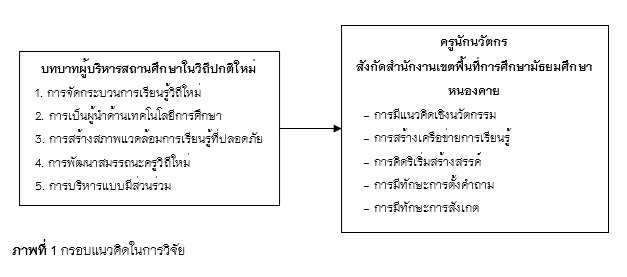บทบาทผู้บริหารสถานศึกษาในวิถีปกติใหม่ที่ส่งผลต่อครูนักนวัตกรสังกัดสำนักงานเขตพื้นที่การศึกษามัธยมศึกษาหนองคาย
Main Article Content
บทคัดย่อ
การวิจัยครั้งนี้มีวัตถุประสงค์เพื่อ 1) ศึกษาระดับบทบาทผู้บริหารสถานศึกษาในวิถีปกติใหม่ 2) ศึกษาระดับครูนักนวัตกร สังกัดสำนักงานเขตพื้นที่การศึกษามัธยมศึกษาหนองคาย และ 3) ศึกษาบทบาทผู้บริหารสถานศึกษาในวิถีปกติใหม่ที่ส่งผลต่อครูนักนวัตกร สังกัดสำนักงานเขตพื้นที่การศึกษามัธยมศึกษาหนองคาย การวิจัยในครั้งนี้เป็นการวิจัยเชิงสาเหตุ กลุ่มตัวอย่าง คือ ผู้บริหารสถานศึกษาและครู จำนวน 285 คน โดยได้จากการสุ่มแบบแบ่งชั้น เครื่องมือที่ใช้ในการวิจัยเป็นแบบสอบถามผู้บริหารสถานศึกษาในวิถีปกติใหม่ที่ส่งผลต่อครูนักนวัตกร สังกัดสำนักงานเขตพื้นที่การศึกษามัธยมศึกษาหนองคาย วิเคราะห์ข้อมูลโดยค่าเฉลี่ย ค่าส่วนเบี่ยงเบนมาตรฐาน ค่าสัมประสิทธิ์สหสัมพันธ์ของเพียร์สัน และทดสอบสมมุติฐานการวิจัยโดยการวิเคราะห์การถดถอยพหุคูณแบบมีขั้นตอน
ผลการวิจัยพบว่า 1) ผู้บริหารสถานศึกษาสังกัดสำนักงานเขตพื้นที่การศึกษามัธยมศึกษาหนองคาย มีบทบาทผู้บริหารสถานศึกษาในวิถีปกติใหม่ โดยภาพรวมอยู่ในระดับมากที่สุด 2) ครูสังกัดสำนักงานเขตพื้นที่การศึกษามัธยมศึกษาหนองคายมีความเป็นครูนักนวัตกร โดยภาพรวมมีการปฏิบัติอยู่ในระดับมากที่สุด และ 3) บทบาทผู้บริหารสถานศึกษาในวิถีปกติใหม่ที่ส่งผลต่อครูนักนวัตกร สังกัดสำนักงานเขตพื้นที่การศึกษามัธยมศึกษาหนองคาย ประกอบด้วย ด้านการบริหารแบบมีส่วนร่วม (X5 ) รองลงมาคือ ด้านการกระบวนการเรียนรู้วิถีใหม่ (X1) ด้านการพัฒนาสมรรถนะครูวิถีใหม่ (X4) ด้านการสร้างสภาพแวดล้อมการเรียนรู้ที่ปลอดภัย (X3) และด้านการเป็นผู้นำด้านเทคโนโลยีการศึกษา (X2) มีค่าสัมประสิทธิ์สหสัมพันธ์พหุคูณเท่ากับ 0.886 มีค่าสัมประสิทธิ์อำนาจพยากรณ์ครูนักนวัตกร ร้อยละ 78.40 อย่างมีนัยสําคัญทางสถิติที่ระดับ .05 สามารถสร้างสมการถดถอยในรูปคะแนนดิบและคะแนนมาตรฐาน ได้ดังนี้
สมการในรูปคะแนนดิบ
Y = 0.543 + 0.343(X5) + 0.165(X1) + 0.131(X4) + 0.130(X3) + 0.117(X2)
สมการพยากรณ์ในรูปแบบคะแนนมาตรฐาน
Zy = 0.417(ZX5) + 0.170(ZX1) + 0.167(ZX4) + 0.153(ZX3) + 0.132(ZX2)
Downloads
Article Details

อนุญาตภายใต้เงื่อนไข Creative Commons Attribution-NonCommercial-NoDerivatives 4.0 International License.
เอกสารอ้างอิง
Aytac, T. (2020). The problems and opinions of school administrators during COVID-19 pandemic: A qualitative study from Turkey. Retrieved from https://files.eric.ed.gov/fulltext/EJ1284612.pdf
Boonged, N. (2022). New normal learning management in educational opportunity expansion schools under Sukhothai Primary Educational Service Area Office 2. (Master of Education, Educational Administration, Uttaradit Rajabhat University). [In Thai]
Boonphak, K. (2020). Learning management in the new normal. Journal of Industrial Education, 19(2), 1-6. [In Thai]
Chamchoy, S. (2020). Secondary school management innovation for create innovators. Journal of Education Naresuan University, 22(2), 193-213. [In Thai]
Chindanurak, T. (2018). Classroom management to develop learning skills in the 21st century. Retrieved from https://so04.tci-thaijo.org/index.php/jmhs1_s/article/view/243539 [In Thai]
Cochran, W. G. (1963). Sampling techniques. New York: John Wiley and Sons Incorporated.
Dolprasit, S. (2021). Educational management guidelines for manpower development in the 21st century. Journal of Teacher Professional Development, 2(1), 1-15. [In Thai]
Duangchuen, P. (2020). Educational management accepts the new normal after the crisis of COVID-19. Journal Management Arts, 4(3), 783-795. [In Thai]
Duangdeekaew, R. (2021). Needs assessment is necessary to develop innovative thinking skills of Administrators of small secondary schools in Nakhon Phanom Province. Journal of Roi Kaensarn Academi, 7(10), 35- 49. [In Thai]
Education Council Secretariat. (2018). A tool to promote the efficiency of learning management of basic education institute (for school administrators). Bangkok: Prikwahn Graphic. [In Thai]
Kerdsritong, A. (2021). Positive leadership: Necessary leadership in the new normal era. In Saowanee Siri. Suksilp (Editor), A collection of articles on educational administration. Khon Kaen: Khon Kaen University Printing Press. [In Thai]
Klaichun, P. (2020). Innovator enhancement model for undergraduate programs of private universities in Thailand. Journal of Social Science and Buddhistic Anthropology, 6(8), 236-252. [In Thai]
Klanarong, M. (2019). The priority needs index modified analysis of Lertlah Kaset-Nawamin School teacher development based on the concept of teacher innovator's characteristics. (Master of Education, Educational Administration, Chulalongkorn University). [In Thai]
Krejcie, R. V. and Morgan, D. W. (1970). Determining sample size for research activities. Educational and psychological measurement, 30(3), 607-610.
Lakkhamphan, W. (2022). Managerial competencies in the new normal of school administrators affecting the quality school under Nong Khai Primary Educational Service Area Office 2. (Master of Education, Educational Administration and Quality Development, Khon Kaen University). [In Thai]
Mathuros, S. (2021). Online education management in the era of new normal COVID-19. Ratchapark Journal, 15(40), 33-42. [In Thai]
Meesuwan, W. (2017). Factors affecting characteristics of teacher innovators in educational technology in school for teaching practice network of Naresuan University. Journal of Education Naresuan University, 19(3), 50-62. [In Thai]
Ministry of Education. (2022). Act on the administration of the Ministry of Education, B.E. 2022. Bangkok: Office of the Permanent Secretary, Ministry of Education. [In Thai]
Mungprasert, K. (2021). Teacher competency model in era of the Thailand 4.0, Phetchaburi Secondary Education Service Area Office. Journal of MCU Buddhapanya Review, 7(1), 78-88. [In Thai]
Nahom, Y. (2021). School administration on the basis of the new normal. Retrieved from http://journalgrad.ssru.ac.th/index.php/8thconference/article/view/2545/2387 [In Thai]
OECD Education and Skills Today. (2021). The role of school heads and why they matter during the COVID pandemic. Retrieved from https://oecdedutoday.com/role-school-principals-heads-covid/
Panaum, A. (2022). Participatory management effecting to the academic performance administration of educational institutes in the 30 School Network Group Office of Education Prawet District Office Bangkok. Journal of Suvarnabhumi Institute of Technology, 8(1), 143-155. [In Thai]
Phitthayasenee, M. and Yuangsoi, P. (2021). Design thinking: New era innovator teachers. Journal of Lampang Rajabhat University, 10(2), 190-198. [In Thai]
Phusri, K. (2021). Innovators strategies for development of secondary school teachers under the Office of the Basic Education Commission. (Doctor of Education, Educational Administration and Development, Mahasarakham University). [In Thai]
Pinasa, A. (2022). Policies of the OBEC and preparing for the opening of the semester of the academic year 2022. Retrieved from https://www.youtube.com/watch?v=AL-yVVS3gwk [In Thai]
Pinkamlang, A. (2020). The participatory management of inclusive school under Samut Songkhram Primary Education Area Office. (Master of Education, Educational Administration, Silpakorn University). [In Thai]
Pongchongmit, T. and Rueangmontri, K. (2020). The development of participatory management guidelines by use the community as a base for small educational institutions under the jurisdiction of the Educational Service Area Office Yasothon Elementary School, Region 1. Mahachulana Nakhonthat Journal, 7(6), 229-243. [In Thai]
Ruamruay, P. and Sucharitrak, P. (2021). The relationship between strategic leadership of school principals and school effectiveness under the Secondary Education Service Area Office 10 Phetchaburi provinces. Sirindhorn Review Journal, 22(1), 210-225. [In Thai]
Siribanpitak, P. (2017). Vision for Thailand 4.0 development supporting documents implemented the development according to the curriculum for the development of educational institutes Thailand 4.0. Bangkok: Thai Wattana Panich. [In Thai]
Sirisuk, P. and Jenkhwao, S. (2021). Educational administrators as a pillar to school success in new normal situations. Panyapiwat Journal, 13(2), 340-353. [In Thai]
Sonloi, A. (2022). Leadership in information technology of school administrators under the jurisdiction of Samut Sakhon Primary Educational Service Area Office. Journal of Institute of Trainer Monk Development. 5(1), 89-101. [In Thai]
The Secondary Educational Service Area Office Nong Khai. (2022). Annual operating plan budget 2023 The Secondary Educational Service Area Office Nong Khai. Retrieved from http://www.kkn3.go.th:81/index.php/2020-06-26-07-14-50 [In Thai]
Thongkaew, T. (2020). Educational design in the new normal life: The impact of the epidemic. Journal of Teacher Professional Development, 1(2), 1-10. [In Thai]
Udomthanathira, K. (2022). The participative management. Retrieved from https://iok2u.com/article/business-administrator/ba-the-participative-management. [In Thai]
Universal Class. (2019). Developing innovative thinking skills. Retrieved from https://www.universalclass.com/articles/ business/developing-innovative-thinking-skills.html


